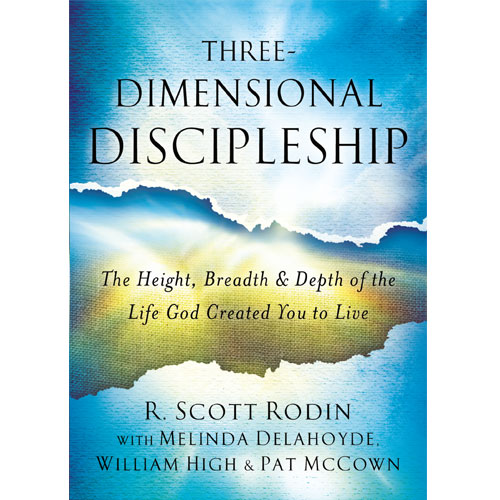The Irrelevant Steward – Our Greatest Hope
A look at Scripture vs. ‘The New Moral Code’

In their compelling recent book, Good Faith, David Kinnaman and Gabe Lyons use extensive research to raise up the primary challenges facing followers of Jesus today. One particularly helpful comparison brings into sharp relief the core issues. It also highlights the critical posture of a steward vs. an owner mentality among God’s people.
I have set two lists side by side to show this comparison. The lists detail what the authors believe are the God’s Moral Order from Scripture, and the New Moral Code, which has become the meta-ethic of our day.[1]
- The New Moral Code says, “To find yourself, look within yourself.” (76%)
- Scripture teaches, “To find yourself, discover the truth outside yourself, in Jesus.”
- The New Moral Code says, “People should not criticize someone else’s life choices.” (76%)
- Scripture teaches, “Loving others does not always mean staying silent.”
- The New Moral Code says, “To be fulfilled in life, pursue the things you desire most.” (72%)
- Scripture teaches, “Joy is found not in pursuing our own desires but in giving of ourselves to bless others.”
- The New Moral Code says, “Enjoying yourself is the highest goal of life.” (66%)
- Scripture teaches, “The highest goal of life is giving glory to God.”
- The New Moral Code says, “People can believe whatever they want as long as those beliefs don’t affect society.” (61%)
- Scripture teaches, “God gives people the freedom to believe whatever they want, but those beliefs always affect society.”
- The New Moral Code says, “Any kind of sexual expression between two consenting adults is fine.” (40%)
- Scripture teaches, “God designed boundaries for sex and sexuality in order for humans to flourish.”
These are two worldviews in direct conflict.
At first blush it may seem obvious we should follow what Scripture teaches in each of these pairings. However, please pay careful attention to the numbers I have included in parentheses. These are the percentages of Practicing Christians who agree with the New Moral Code!
What this means, for example, is 76% of Practicing Christians (defined by the authors as people who say their Christian faith is very important in their lives and attend church at least once a month)[2] agree, “To find yourself, look within yourself.” They have bought the lie of the owner and see life in terms of their own self-fulfillment.
As I survey this list and read Good Faith, and the more recent Barna Trends, I am more disturbed by the responses of practicing Christians than I am the larger cultural moral decline. Certainly, the latter is deeply concerning, but I believe the only hope of recovering a God-honoring cultural morality is for followers of Jesus to live and speak as faithful, surrendered stewards into these issues. To demonstrate this, let’s frame the same six issues in owner/steward terms.
- Owner mindset, “The meaning of life is found within me, I need nothing else but me.”
- Steward mindset, “The meaning in life is found in Jesus, and I find it when I surrender my life to Him.”
- Owner mindset, “My choices are my own and no one should criticize them.”
- Steward mindset, “Our life, and our choices are not our own, and we must be stewards of our relationships with others, even if it means challenging the choices they make.”
- Owner mindset, “Fulfillment comes in pursuing the things I desire, I own my life and I am the center of determining what is good and fulfilling for me.”
- Steward mindset, “Fulfillment comes from surrendering ourselves in love and service to others. God determines what is fulfilling for me, because my life belongs to Him.”
- Owner mindset, “I control my life and so I pursue those things which bring me pleasure, and pleasure is my measurement for success,”
- Steward mindset, “God controls my life, and so I pursue those things which bring Him glory, and His glory is my definition of success.”
- Owner mindset, “My life is mine, so if you want to believe something I disagree with, fine, just make sure it does not interfere with my own pursuit of happiness.”
- Steward mindset, “My life is God’s and when He calls me to live and act and speak His truth, I will do so understanding it will upset, offend and disturb some people. This is not my intent, but I will be faithful regardless of the cost.”
- Owner mindset, “My ideas of sexual expression are mine alone, and no one has the right to tell me or anyone else to live any other way.”
- Steward mindset, “Our sexuality and the boundaries of its expression belong to God, and we follow and advocate for His ways as faithful stewards.”
I believe at the heart of this deepening divide is a battle that goes back to Genesis 3. It is the enemy’s offer of a life where we can ‘be like God’, knowing right from wrong. What we have now added to the temptation of choosing right from wrong is the right to be the arbitrator for what we, personally, define as right and wrong. This has produced a culture bent on protecting every individual right to define and live according to each person’s own standards.
This is Genesis 3 on steroids. This may be beyond the enemy’s wildest dreams. And it is the battle of our generation as Jesus followers. But how can we battle when so many within our own ranks don’t even recognize the problem? How can followers of Jesus impact this world for Christ if we, ourselves, are accommodating our views to the same Moral Code?
In the inimitable words of Pogo, “We have met the enemy, and he is us.”
The revival of our cultural morality must begin with the transformation of God’s people, which includes a denunciation of our penchant for ownership. It begins with repentance, followed by an unprecedented level of surrender in our lives. It will call us to wade directly upstream in a culture rushing downstream toward destruction. It will demand our total allegiance and what Henri Nouwen called, “our own vulnerable self.” Ironically, Nouwen calls us to embrace a form of irrelevancy where we decrease and Christ alone is seen and known through us.
I am telling you all this because I am deeply convinced that the Christian leader of the future is called to be completely irrelevant and to stand in this world with nothing to offer but his or her own vulnerable self. That is the way Jesus came to reveal God’s love. The great message that we have to carry, as ministers of God’s Word and followers of Jesus, is that God loves us not because of what we do or accomplish, but because God has created and redeemed us in love and has chosen us to proclaim that love as the true source of all human life.[3]
This is the irrelevancy of the faithful, surrendered steward. It is our calling. It is our vocation. And it is the only true hope of the culture of our day. Nouwen concludes,
The leaders of the future will be those who dare to claim their irrelevance in the contemporary world as a divine vocation that allows them to enter into a deep solidarity with the anguish underlying all the glitter of success, and to bring the light of Jesus there.[4]
[1] Kinnaman, David; Lyons, Gabe (2016-02-23). Good Faith: Being a Christian When Society Thinks You’re Irrelevant and Extreme (p. 57, 60). Baker Publishing Group. Kindle Edition.
[2] Kinnaman, David; Lyons, Gabe (2016-02-23). Good Faith: Being a Christian When Society Thinks You’re Irrelevant and Extreme (p. 35). Baker Publishing Group. Kindle Edition.
[3] Nouwen, Henri J. M. (1992-10-01). In the Name of Jesus: Reflections on Christian Leadership (Kindle Locations 188-192). The Crossroad Publishing Company. Kindle Edition.
[4] Nouwen, Henri J. M. (1992-10-01). In the Name of Jesus: Reflections on Christian Leadership (Kindle Locations 230-231). The Crossroad Publishing Company. Kindle Edition.





